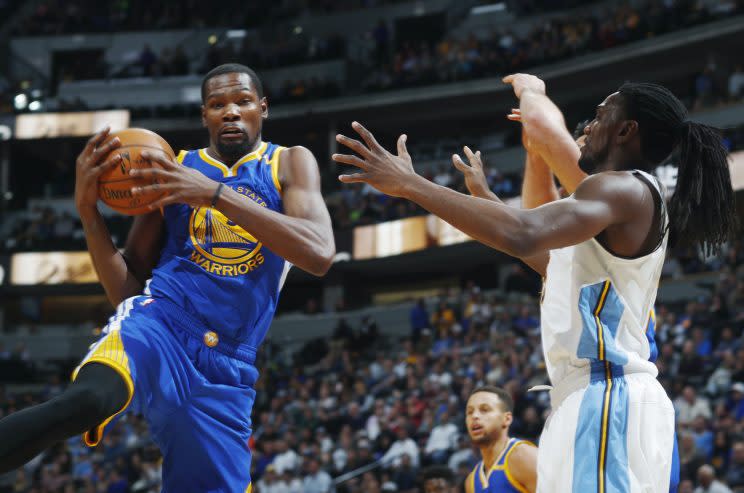Warriors' win brings end to Durant's Jordan-tying scoring streak

Scoring streaks can be arbitrary, but they still say plenty about a player’s talents. For instance, the fact that Golden State Warriors superstar Kevin Durant entered Thursday night’s game at the Denver Nuggets with 72 consecutive games of at least 20 points isn’t really necessary to convince basketball fans that he’s one of the best scorers the NBA has ever seen. Nevertheless, it’s pretty cool to note that his 28 points in Wednesday’s comfortable win over the Dallas Mavericks brought KD into a tie with Michael Jordan for the fourth-longest such streak in NBA history and the longest in the past 50 years. Any number of things could have derailed the streak, but Durant kept finding ways to put up his stats due to his immense talent and skill.
[Join a Yahoo Daily Fantasy Basketball contest now | Free NBA Yahoo Cup entry]
The oddity of the streak was reinforced in Denver, when Durant scored 18 points to stay alongside Jordan in the record books. However, the Warriors forward did not struggle to take or make shots — he finished short of the 20-point threshhold largely because the Warriors dominated in a 125-101 win. Durant shot 8-of-16 from the field in his 30 minutes (his lowest total this season) and entered the fourth quarter with just 14 points and a 24-point lead. Head coach Steve Kerr left him in for the first six minutes of the period, but a contact-laden offensive foul just inside the 6:00 mark made it clear that there was little reason to flirt with injury in pursuit of an arbitrary statistical milestone.
Kevin Durant's streak of consecutive 20-point games ends at 72 after an 18-point night vs the Nuggets. pic.twitter.com/H72C6E2Frq
— ESPN Stats & Info (@ESPNStatsInfo) November 11, 2016
The names ahead of Durant and Jordan on this list show just what kind of player can accomplish such a thing. Wilt Chamberlain (the two longest streaks) and Oscar Robertson are among the greatest players in the history of the sport, and they also happened to play in an era where games featured many more possessions and defenses were relatively lax. For that matter, Durant’s streak would likely have been even longer if not for an injury on November 10, 2015. He scored 14 in only 16 minutes that night to end a season-opening streak of seven games with at least 20 points.
As the score indicates, Thursday night’s win was not without offensive highlights for the Warriors. Many of them came from Stephen Curry, who scored a game-high 33 points (7-of-13 3FG) to go with seven assists and five rebounds. Any concerns brought on by Curry’s own record streak-ending 0-of-10 mark from long range last Friday have been erased by this week — he’s broken the record for three-pointers in a game, been “part of a team record for the most players with at least four threes, and offered the kind of incredible performance that he’s made commonplace in his two MVP seasons.
Don’t look now, but the Warriors offense is beginning to put together enough consistent performances to seem like the juggernaut we all expected when Durant signed his contract in July. Thursday’s win brought plenty of notable stats — 54.1 percent shooting from the field, 14-of-30 on threes, 19-of-20 from the line — but the overarching impression of the last week has been that most every NBA team will have to give up open shots to All-Stars whenever Golden State’s offense is moderately functional. The win over Denver put them ahead of the Cleveland Cavaliers for the No. 1 spot in the NBA’s offensive efficiency rankings, and it wouldn’t be shocking to see them hold onto it through the end of the season. This could be a new normal.
[Follow Dunks Don’t Lie on Tumblr: The best slams from all of basketball]
If anything, the story isn’t that Durant’s streak ended. It’s that his decreased output didn’t slow down the attack one bit.
– – – – – – –
Eric Freeman is a writer for Ball Don’t Lie on Yahoo Sports. Have a tip? Email him at efreeman_ysports@yahoo.com or follow him on Twitter!

 Yahoo Sports
Yahoo Sports 

